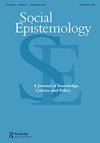Regulating Social Media as a Public Good: Limiting Epistemic Segregation
IF 2
2区 哲学
Q1 HISTORY & PHILOSOPHY OF SCIENCE
引用次数: 0
Abstract
The rise of social media has correlated with an increase in political polarization, which many perceive as a threat to public discourse and democratic governance. This paper presents a framework, drawing on social epistemology and the economic theory of public goods, to explain how social media can contribute to polarization, making us collectively poorer, even while it provides a preferable media experience for individual consumers. Collective knowledge and consensus is best served by having richly connected networks that are epistemically integrated: individuals with diverse levels of expertise should be relatively well connected to each other. In epistemically segregated networks, by contrast, we have reason to predict collective epistemic failures. Expert knowledge will be isolated from the majority, leading average opinion to be less informed than is socially optimal, and entrenching disagreements. Because social media enables users to very easily adopt homophilous network connections – connections to those with similar opinions, education levels, and social backgrounds – it is likely to have increased epistemic segregation compared to older media platforms. The paper explains the theoretical foundations of these predictions, and sketches regulatory measures – such as taxes – that might be employed to preserve the public good of a well integrated social media network.将社交媒体作为一种公共产品进行监管:限制认知隔离
社交媒体的兴起与政治两极分化的加剧有关,许多人认为这是对公共话语和民主治理的威胁。本文提出了一个框架,利用社会认识论和公共产品的经济理论,来解释社交媒体如何有助于两极分化,使我们集体变穷,即使它为个人消费者提供了更好的媒体体验。集体知识和共识的最佳服务方式是拥有丰富的连接网络,这些网络在认知上是整合的:拥有不同专业知识水平的个人应该相对良好地相互连接。相比之下,在认知隔离的网络中,我们有理由预测集体认知失败。专家知识将与大多数人隔离开来,导致普通意见比社会最优意见了解得更少,并加深分歧。因为社交媒体使用户能够很容易地采用同质网络连接——与那些观点、教育水平和社会背景相似的人建立联系——与旧媒体平台相比,它可能会增加认知隔离。这篇论文解释了这些预测的理论基础,并概述了监管措施——比如税收——可能被用来保护一个整合良好的社交媒体网络的公共利益。
本文章由计算机程序翻译,如有差异,请以英文原文为准。
求助全文
约1分钟内获得全文
求助全文
来源期刊

Social Epistemology
Multiple-
CiteScore
2.60
自引率
17.60%
发文量
60
期刊介绍:
Social Epistemology provides a forum for philosophical and social scientific enquiry that incorporates the work of scholars from a variety of disciplines who share a concern with the production, assessment and validation of knowledge. The journal covers both empirical research into the origination and transmission of knowledge and normative considerations which arise as such research is implemented, serving as a guide for directing contemporary knowledge enterprises. Social Epistemology publishes "exchanges" which are the collective product of several contributors and take the form of critical syntheses, open peer commentaries interviews, applications, provocations, reviews and responses
 求助内容:
求助内容: 应助结果提醒方式:
应助结果提醒方式:


